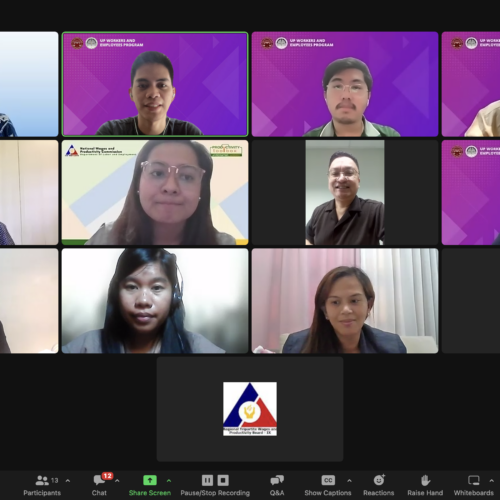UP Law WEP calls for Minimum Wage Increase in the Private Sector
The University of the Philippines (UP) College of Law/Law Center Workers and Employees Program (WEP) conducted two online round table discussions (RTDs) last 24 February and 2 March 2024 with the theme “Raising the Minimum Wage in the Private Sector, Improving Quality of Life.”
The first RTD last February was attended by 26 partners, including representatives from the Office of Representative Arlene D. Brosas of Gabriela Women’s Party, the National Wages and Productivity Commission (NWPC), the Regional Tripartite Wages and Productivity Boards (RTWPBs), various organizations, unions and federations of workers and employees, non-governmental organizations (NGOs), as well as individual workers and employees.
Atty. Arnold F. de Vera, WEP Program Director, welcomed the attendees to the RTD, remarking that the aim was to reach a consensus on the amount of the proposed minimum wage increase. The agreed-upon amount would then be submitted to the House of Representatives Committee on Labor and Employment for its 28 February 2024 hearing (House Labor Committee Hearing).
Atty. de Vera reported that the Senate, by unanimous vote, approved on third and final reading Senate Bill No. 2534, which seeks to increase the daily minimum wage rates of workers in the private sector by PHP 100. The bill covers all minimum wage earners nationwide, whether agricultural or non-agricultural and regardless of employment status, including those in contractual and subcontractual arrangements.
The plenary sessions were facilitated by Atty. Emir-Deogene V. Mendoza and Atty. Jasper Frederick C. Briones, WEP Senior Legal Associate and Junior Legal Associate, respectively.
The following points were raised in the first RTD:
- Susanita Tesiorna of the Alliance of Workers in the Informal Economy/Sector (ALLWIES) and National Anti-Poverty Commission (NAPC) disagreed on the proposed wage increase, saying that only those organized groups, as defined by Department of Labor and Employment (DOLE) Department Order No. 40-03, would benefit from the said proposal. She stated that the bill, if passed, would result in inflation and that those who will not benefit from the measure would bear the cost of the increase in prices.
- Sonny Africa of the IBON Foundation countered that the wage hike will not necessarily result in inflation and proposed a P1,200 family living wage which should apply to all regions nationwide. IBON estimates show that around 15 of the county’s 17 regions maintained a family living wage of P900 to P1,300. Moreover, real wage rates have not really increased since 1989 (when the Wage Rationalization Act was passed). It is believed that the regional wage-fixing machinery has contributed to the perpetuation of repressed real wage rates as businesses would take advantage of the regional setting. Although there are differences in the economic situation of different regions in the Philippines, Mr. Africa asserted that these are not significant to overcome the need for the proposed across-the-board wage increase, believing that there is no material difference in what it means to live decently, from the point of view of an average worker and regardless of location in the country.
- WEP Founding Director Prof. Patricia R.P. Salvador Daway notes that Senate President Juan Miguel Zubiri already underscored, in an interview, the benefits granted to businesses under the recently passed CREATE Law, Republic Act No. 11534. The non-passage of the proposal to increase the dividends tax has likewise served to benefit businesses. It was therefore necessary that the government now turn to the needs of workers and increase their wages, in line with the right to a living wage mandated by the Constitution. The proposed P100, to her mind, is a measly sum and should be further increased.
- Levi Francisco of the Alliance of Nationalist and Genuine Labor Organization (ANGLO-KMU) agreed that there was no correlation between the wage hike and inflation. She emphasized that around 50 million workers would directly and indirectly benefit from the wage increase and that rejecting it would be counter-productive. The wage hike would actually serve to increase the purchasing power of workers, further increasing demand and productivity.
- Narciso Dalumpines of Pag-aalay ng Puso Foundation supported the PHP 1,200 family living wage. He stated that in one survey, a family of five would have an average per capita expediture of around PHP 250 per day for the family’s basic needs. In addition, he urged for the government to modernizeproduction facilities that would increase the per-unit productive capacity of workers and noted that wage increases would also lead to an increase of economic activity, which further benefits the manufacturers.
- Liwayway “Dawn” Arce-Rodriguez preferred to use the version of Section 8 on creditable wage increase under House Bill No. 7568, rather than Section 5 on non-chargeability of prior increase under the approved Senate Bill.
The RTD partners eventually agreed to set the fixed minimum wage at PHP 1,000, to be enforced across-the-board or nationwide.
The second RTD last March was attended by 8 partners, including representatives from ALLWIES and the National Anti-Poverty Commission (NAPC), the NWPC, the RTWPBs, and the Department of Health (DOH).
In his opening remarks, Atty. de Vera informed the partners that WEP had submitted its Position Paper for the House Labor Committee Hearing, covering the discussions made during the first RTD. Meanwhile, Atty. Briones provided the RTD participants with an update on the House Labor Committee Hearing last 28 February.
Atty. Briones summarized the points raised by stakeholders present during the House Labor Committee Hearing:
- He noted that the available data reveal the disparities between the real daily minimum wage and the daily poverty threshold of the various regions. For instance, in the National Capital Region, the difference between the real value of wages and the poverty threshold is P17.
- Labor and management groups present had conflicting positions on the proposed legislative wage hike. An increase in wages would be a welcome development for the labor groups, as they believe that the current regional amounts could no longer sustain the workers’ daily needs. Since the Constitution guarantees a living wage, the labor groups proposed that the minimum wage should be raised to meet the family living wage.
- On the other hand, the management groups pointed out that around 90% of the establishments are MSMEs (micro, small, and medium-sized enterprises). A concern was raised that these entities may not be able to sustain the wage increases and are therefore in danger of closing, which might cause further unemployment.
- Some stakeholders have raised concerns that aside from inflation, another possible consequence of the proposed wage increase would be its negative impact on the competitive position of the Philippines in the global economy, ast foreign investors also look into the labor costs of various countries as a factor of production when undertaking investment decisions.
The plenary sessions were moderated by Atty. Mendoza, Atty. Briones, and Atty. Marwil N. Llasos of WEP.
- Susanita Tesiorna of ALLWIES / NAPC expressed concern that the informal sector might become a catching basin in the event that wage increases would cause inflation and unemployment, as this sector consists of unprotected workers.
- Prof. Leo Battad reiterated WEP’s position in favor of a wage increase and said that support may be given to the MSMEs to avoid business closure, recognizing the legislative measure’s possible effect on them. It was also pointed out that we should look into the living wage under the Constitution. Assoc. Prof. Battad notes that the living wage is higher than the minimum wage.
- Tesiorna inquired about the legal definition of a living wage. Atty. Briones mentioned that the Constitution did not provide a definition, and it would be necessary to refer to the records of the Constitutional Commission todetermine the framers’ intention behind the provision.
- Citing Constitutional Commissioner Jose C. Colayco, the concept of having a decent living wage was first used in Pope Leo XIII’s 1891 encyclical titled Rerum Novarum. It includes not only food and recreation, but also social and religious opportunities for the worker, his spouse, and his family.
- Prof. Battad noted that there is currently no legal definition of a living wage, and explained that it would be better to have one. The basic needs and social services necessary to live a dignified life must be defined. Concerning the definition of the living wage, Atty. April Dawn Villamor of the NWPC mentioned that it had prepared and presented its position paper to the Senate. Should the definition of the living wage be tackled or raised as a concern during the sessions in Congress, she informed the RTD participants that the NWPC will address it in their position paper and proviede their inputs in those sessions.
- As regards the scope of the measure , House Bills No. 525 and 4471 state that all workers are covered, “whether working as a regular, contractual, or casual employee, inclusive or both non-agricultural and agricultural employment.” Ms. Tesiorna commented that the terms “informal employment” and “informal economy” be operationalized by the Philippine Statistics Authority (PSA). Ultimately, she said that it is a welcome objective for all workers to be formalized and be included in the coverage of the bill, especially as this would be in line with the International Labor Organization (ILO) Recommendation No. 204.
- On the matter of coverage, it was asked whether the exclusion of domestic workers would mean that domestic workers would still fall under the RTWPB. On this matter, Atty. Briones responded that thematter must be clarified based on the working draft of the house. Prof. Daway had noted in the previous RTD that a separate law already exists, Republic Act No. 10361 or the Batas Kasambahay, and that separate wage orders are issued for the kasambahay.
- On workers paid on a pakyaw basis, Assoc. Prof. Battad mentioned that the IRR of the Labor Code contains a way to compute the wage for eight hours of work based on time and motion studies andsuggested that this be added to the measure. Tesiorna agreed to these suggestions as her group had encountered difficulties in computation due to the requirement of working five years in the same job prior.
- Regarding wage subsidies, the discussion focused on enterprises that may be affected by House Bill Nos. 7568 and 7871, particularly micro and small enterprises as well as small landowners. Ms. Tesiorna posed a query as to what constitutes “small” in this setting. She and Atty. Marwil Llasos agreed that micro and small enterprises and small landowners, as understoodin the Agriculture and Fisheries Modernization Act of 1997 (Republic Act No. 8435) and the Comprehensive Agrarian Reform Law of 1988 (Republic Act No. 6657, as amended), would be the same as how the idea is understood in the bills. However, Ms. Tesiorna asked whether the land area should serve as the basis under the bills, or if it would be better if the basis should be if the land is earning profit. Thus, she sees that the proposed wage increase would apply only to corporate farms.
- Tesiorna requested for clarification if the nature of the subsidy would be in the form of an ayuda, or financial aid given in social programs of the government, as she preferred assistance to be in the form of empowerment. However, Atty. Llasos asked if, in general, the employer could afford to have the wage increase even without the subsidy. Ms. Tesiorna recognized that smaller businesses probably would not be able to afford the increase. Thus, she proposed that other means be made available, such as providing access to credit. Assoc. Prof. Battad and Atty. Briones commented that there are existing laws that providefor other forms of subsidy, such as Republic Act No. 10644, or the Go Negosyo Act. However, Ms. Tesiorna pointed out that the said law only facilitated access to credit. She also expressed concern over the implementation of Republic Act No. 9178, or the Barangay Micro Business Enterprises (BMBEs) Act of 2002, since after over two decades, only 758 enterprises have been registered. Moreover, she observes that the said law has been used as a window for businesses to downsize, even if they have the means to maintain their original level of operations. In this regard, Ms. Tesiorna emphasized the importance of labor inspections to avoid such instances of fraud.
Atty. Mendoza thanked the participants, and requested that everyone stay in touch and share what would happen during the next Committee hearing.












































































































 on the upper right corner to select a video.
on the upper right corner to select a video.